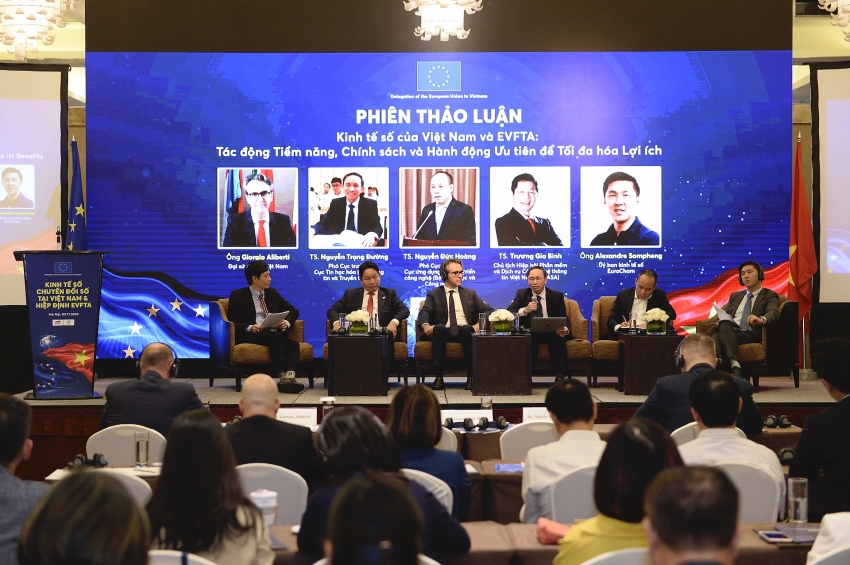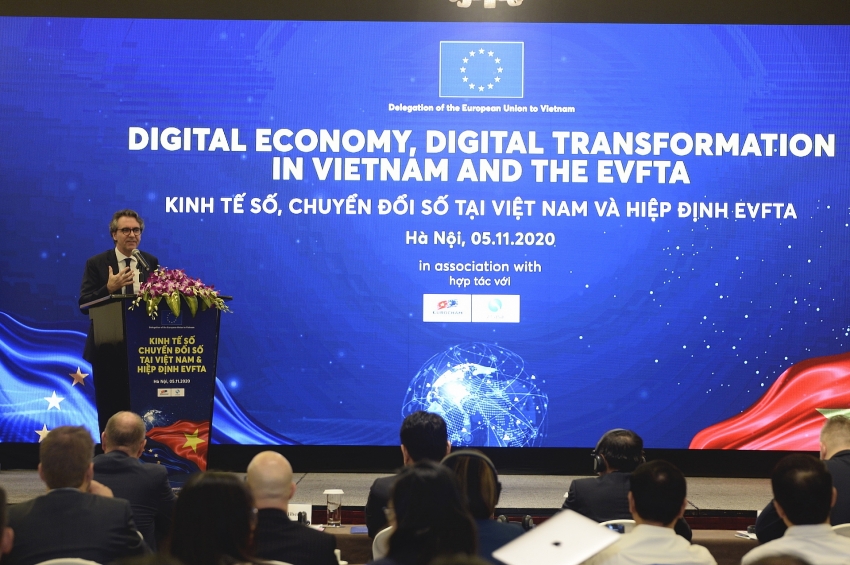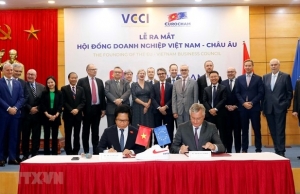EVFTA to spur Vietnam’s digital transformation
 |
| Participants discussed the opportunities and challenges facing Vietnam’s digital economy and digital transformation |
On November 5, the Delegation of the European Union to Vietnam (The EUD) in coordination with the Vietnam Software and IT Services Association and EuroCham organised a roundtable on digital economy, digital transformation in Vietnam, and the EVFTA, attracting more than 100 attendants from ministries, government agencies, EU member states, associations, academic institutions, and businesses.
During the event, participants discussed topics such as current status, opportunities, challenges of Vietnam’s digital economy, and digital transformation, as well as the EVFTA and its possible spurring of the digital economy and digital transformation in Vietnam. Also at the seminar, the panelists held a discussion themed “Vietnam Digital Economy and the EVFTA: Potential Impact, Prioritised Policies, and Actions to Maximize its Benefits”.
 |
| Giorgio Aliberti, EU Ambassador to Vietnam, speaking at the roundtable |
In his opening statement, Giorgio Aliberti, EU Ambassador to Vietnam said that the COVID pandemic has highlighted the importance of digitalisation more than ever before. Vietnam is one of the fastest-growing economies in the world and it is also an attractive market for European Businesses.
“Nowadays, we can transport things, shipping goods, buying online, and do procedures quickly thanks to the advancement of digital technology. With these changes, the processes will become less complicated and less time-consuming. And the EVFTA is a very promising platform for sharing common values, not only economic benefits but also a solution for both sides to win,” he added.
As the lead economist of the World Bank in Vietnam, Jacques Morisset, pointed out three megatrends which will have huge impacts on the economy: (de)globalisation, contact-free, and value of life. Vietnam is moving toward a contact-free economy and this trend has been accelerated by COVID-19. However, beyond tools, changes in mindset are required if Vietnam wants to create the foundations for future growth in a digitalised world.
The representative of the Authority of Information Technology Application (AITA) under the Ministry of Information and Communications (MIC) also discussed the strategies and policies to maximise the benefits of international trade agreements like the EVFTA to promote the digital economy in Vietnam.
The representative of the State Agency for Technological Innovation (SATI) under the Ministry of Science and Technology also presented his opinion on strengthening science and technology cooperation between Vietnam and the EU so it can contribute even more to the digital economy and digital transformation in Vietnam as well as improve the EU-Vietnam partnership.
Views on the digital economy in Vietnam, and its intention to invest in the digital economy in Vietnam were also presented by the speakers from VINASA, VIDTI, and EuroCham.
In recent years, Vietnam’s digital economy has been booming and is the second-fastest-growing market in Southeast Asia. The digital economy in Vietnam is expected to benefit from the EVFTA which has recently become effective and from the impact of COVID-19.
This is the second out of three roundtable events organised by the Delegation under the framework of the EU-Vietnam Partnership Facility (EVPF) until the end of 2020. The upcoming third roundtable will focus on the business environment for European and Vietnamese Startups and SMEs in Vietnam and is scheduled for early-December 2020.
Vietnam’s digital economy has been booming and is the second-fastest-growing market in Southeast Asia after Indonesia. The internet economy of Vietnam has reached a value of $12 billion in 2019, with an annual growth rate of 38 per cent since 2015, and is expected to surge to $43 billion by 2025.
With the gross merchandise value traded over the internet in Vietnam set to account for over 5 per cent of the country’s GDP in 2019. In 2019, an estimated 61 million Vietnamese went online and the average Vietnamese spent three hours and 12 minutes each day using the internet on mobile devices like smartphones. Vietnam is also committed to expanding its digital economy, aiming to bring it to 20 per cent of the GDP by 2025. Social distancing and lockdown during COVID-19 have further accelerated the use of digital technologies to mitigate the impacts of business and social life disruptions.
Digital transformation is an indispensable factor to help businesses gradually get used to the new normal after the COVID-19 pandemic. For Vietnam, 61 per cent of business leaders surveyed have already seen changes in customers’ purchasing behaviour and motivations since the start of 2020, while 22 per cent of businesses have not seen any changes in their customer’s needs and 16 per cent remained unsure. Prior to the COVID-19 crisis, the drivers of technology were focused on cost reduction and productivity. The goal was to make well-run businesses run better. As we adapt to the new realities caused by COVID-19, the roles of technology will have to evolve to achieve resiliency, deliver profitability, and act sustainably.
What the stars mean:
★ Poor ★ ★ Promising ★★★ Good ★★★★ Very good ★★★★★ Exceptional
Themes: Digital Transformation
- PM sets five key tasks to accelerate sci-tech development
- Ho Chi Minh City launches plan for innovation and digital transformation
- Dassault Systèmes and Nvidia to build platform powering virtual twins
- Sci-tech sector sees January revenue growth of 23 per cent
- Advanced semiconductor testing and packaging plant to become operational in 2027
Related Contents
Latest News
More News
- VinaCapital launches Vietnam's first two strategic-beta ETFs (February 26, 2026 | 09:00)
- PM sets five key tasks to accelerate sci-tech development (February 26, 2026 | 08:00)
- PM outlines new tasks for healthcare sector (February 25, 2026 | 16:00)
- Citi report finds global trade transformed by tariffs and AI (February 25, 2026 | 10:49)
- Vietnam sets ambitious dairy growth targets (February 24, 2026 | 18:00)
- Vietnam, New Zealand seek level-up in ties (February 19, 2026 | 18:06)
- Untapped potential in relations with Indonesia (February 19, 2026 | 17:56)
- German strengths match Vietnamese aspirations (February 19, 2026 | 17:40)
- Vietnam’s pivotal year for advancing sustainability (February 19, 2026 | 08:44)
- Strengthening the core role of industry and trade (February 19, 2026 | 08:35)





 Tag:
Tag:






















 Mobile Version
Mobile Version